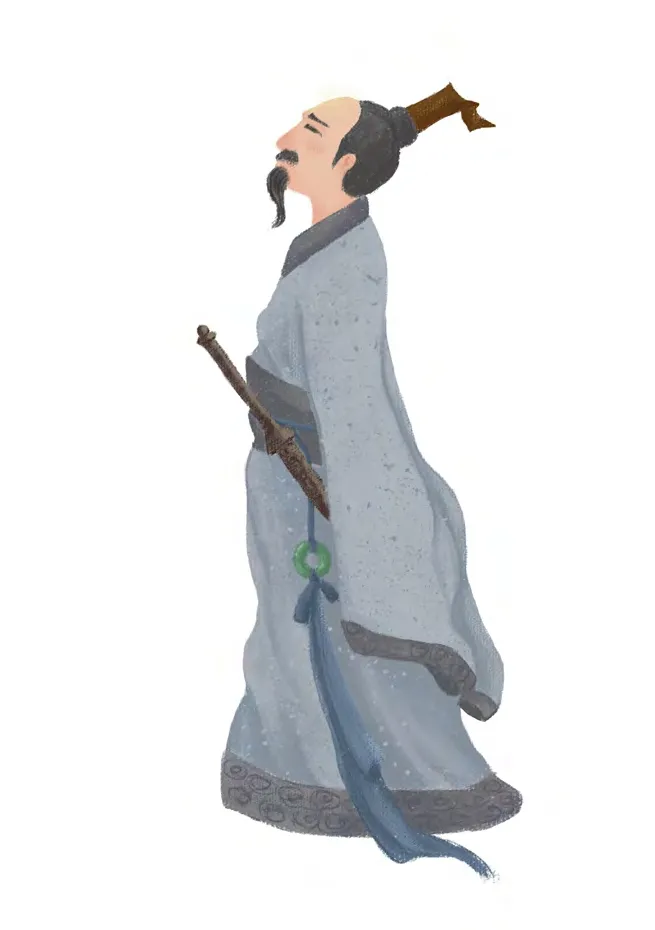The Madman of the Chu State
By Chen Long
There is a special genre of Chinese intellectuals, nicknamed the “madmen” in the ancient Chu State. They were politically ambitious, socially unconventional and full of criticism towards the society. They left us a rich cultural legacy of independent spirits in Chinese history.
One particular spirit was born in Hubei, which was called the State of Chu in ancient times.
When Confucius was trying to promote his ideology of benevolence statewide, hoping to help the declining Zhou Dynasty re-glorify its rules and rites, he traveled around the country and engaged in lobbying activities. When he came to the Chu State, an old man working in the field saw his carriage and began singing to him, the song lyrics were as follows: Phoenix, Phoenix, how come you became unwise. The past cannot be retrieved while the future can still be changed. Stop, stop! How dangerous it is to be a politician in times of chaos.
When hearing it Confucius couldn’t help chasing after him, asking him about strategies for governing a country. Yet the old man walked away very quickly. Confucius appreciated the old man’s talents and insights, and jokingly called him “the madman of Chu.”
More than 1200 years later in the Tang Dynasty, the famous poet Li Bai settled in Hubei, where he got married, had children, and stayed there for ten years. He identified himself a Chu man, with Chu people’s personality, for which he wrote this famous verse: I’ve always been the madman of Chu/ Singing freely to satire Confucian ideals. (I am a free madman of Chu, and I dare to sing a song laughing at the orthodox Confucius).


In 740 BC, Xiong Tong became the king of Chu, known as King Wu. He renounced the rule of Zhou Dynasty over his territory. Afterwards the State of Chu unified more than 60 tribes in southern China, expanding itself from a small country of only a few square kilometres to a large country with a territory of 2,500 kilometers and a population of several million. With its territory covering the southern half of what is now China, the State of Chu became a center of national integration in the south.
The rules and rites established by the Zhou Dynasty were regarded as moral standards at the time. Sacrifice and godworshiping were carried out in a manner of discreetness and prudence, demanding solemn appearances and respectful conduct. But some people in the State of Chu “defied” the regime of Zhou. They worshiped ghosts and witches. They sang and danced in their sacrifice ceremonies, embodying passionate mountain ghosts in cloaks and ethereal fairies with streaming sleeves—all of which made lively scenes. These differences were a way for Chu people to show their liberal spirit against the rule of Zhou Dynasty.
People of Zhou honored the south, while people of Chu honored the east; people of Zhou honored the right while people of Chu honored the left. These behaviors were not in accordance with the rules and rituals of the time, hence, they were considered mad and wild. (Translation: Lu Qiongyao)
楚狂人
文/陳龍
中國知識分子中有一個另類的群體,被稱作狂士。他們志向高遠,特立獨行,對社會充滿批判,在中國思想文化史上留下一種獨立的人格精神。
這種狂士精神最早起源于湖北。
當時孔子在中國各地傳播他的仁愛思想,希望通過游說讓衰落的周朝重新建立起國家的禮儀與秩序。他來到楚國,一位在地里勞作的老者看到他的馬車,對他唱了起來,大意是:鳳凰啊,鳳凰啊,你怎么變得不聰明了,過去的事情無法挽回,未來的事情還可以改變,你還是停止吧,停止吧!混亂時代做一名政客多么危險。
孔子追趕他,想向他請教治理國家的辦法,老農卻快步而去。孔子贊嘆老農的思想見地,并稱老農為“楚狂人”。
1200多年后的中國唐朝年間,詩人李白來到湖北,在此娶妻生子,在湖北居住了十年。他認為自己已經有了楚人的秉性,把自己當成了湖北人,并寫下詩句:我本楚狂人,鳳歌笑孔丘(我就是那個自由的楚國狂人,我也敢于唱一首歌來嘲笑執迷不悟的孔子)。
公元前740年,一個叫熊通的人做了楚國國君,號稱楚武王。他詔告天下,不再接受周朝統治。楚國進而統一中國南部60多個部落后,從一個方圓僅數十里的小國,變成了土地五千里,人口幾百萬的大國,疆域覆蓋當時中國的南半部,成了南方民族融合的一個中心。
周朝創立的禮法制度在當時被奉為正統,他們對待祭祀十分慎重,要求容貌舉止端正肅穆(相維辟公,天子穆穆)。但是楚國人“不服周”,他們信巫鬼,祭祀時喜愛載歌載舞,有時扮演披蘿帶荔的多情山鬼,有時扮演仙袂飄飄的云中神仙,場面十分熱鬧。楚國人通過生活細節的逆反,達到對抗周朝的精神釋放。
周人尚南,楚人尚東,周人尚右,楚人尚左。這些不合“禮法”的行為,被認為是狂放。


